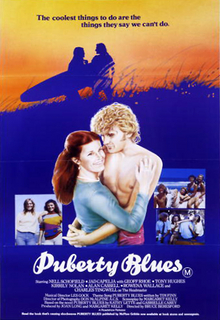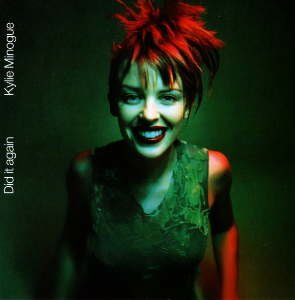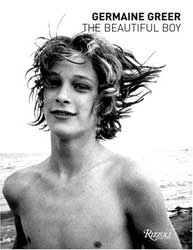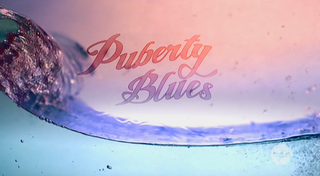
Kathryn Marie Lette is an Australian and British author.

"It's No Secret" is a song by Australian singer-songwriter Kylie Minogue taken from her debut studio album Kylie (1988). The song was written and produced by Stock, Aitken and Waterman, who were also the producers of Minogue's first four studio albums. The song was intended to be released as the fifth single from Kylie, but due to the success and longevity of Kylie's massive selling duet with Jason Donovan, "Especially for You", over Christmas 1988 and the following new year, it was only released in a handful of countries. In the United States, "It's No Secret" was released as Kylie's third single where it reached the top 40 of the Billboard Hot 100.

Puberty Blues is a 1981 Australian coming-of-age comedy-drama film directed by Bruce Beresford, based on the 1979 novel of the same name by Kathy Lette and Gabrielle Carey.

"Did It Again" is a song by Australian recording artist Kylie Minogue, originally featured on her sixth studio album Impossible Princess (1997). The song was released as the album's second single on 24 November 1997 through Mushroom, Deconstruction, and BMG. Minogue had written the track with Steve Anderson and Dave Seaman, and it was produced by Minogue in collaboration with Brothers in Rhythm. Backed by guitars and drum, "Did It Again" is a pop rock track in which Minogue sings about her self-consciousness and self-hatred.
The 16th Annual Australian Recording Industry Association Music Awards were held on 15 October 2002 at the Sydney SuperDome.

"Shocked" is a song by Australian singer Kylie Minogue from her third studio album, Rhythm of Love (1990). Written and produced by Stock Aitken and Waterman, "Shocked" was released as the album's fourth and final single in May 1991 by Mushroom and PWL. The song later appeared on most of Minogue's major compilations including Greatest Hits (1992), Ultimate Kylie (2004) and Step Back In Time: The Definitive Collection (2019). The DNA 7-inch mix of the song also includes a rap in the bridge by Jazzi P.
Gabrielle Carey was an Australian writer who co-wrote the teen novel, Puberty Blues with Kathy Lette. This novel was the first teenage novel published in Australia that was written by teenagers. Carey became a senior lecturer in the Creative Writing program at the University of Technology Sydney, studying James Joyce and Randolph Stow.

The Beautiful Boy is a book by radical feminist academic Germaine Greer, published in 2003 as The Boy in the Commonwealth by Thames & Hudson and in the rest of the world by Rizzoli. Its avowed intention was "to advance women's reclamation of their capacity for and right to visual pleasure". The book is a study of the youthful male face and form, from antiquity to the present day, from paintings and drawings to statuary and photographs.

Germaine Greer is an Australian writer and public intellectual, regarded as one of the major voices of the second-wave feminism movement in the latter half of the 20th century.

Charlotte Elise Best is an Australian actress and model. She is best known for her role in the show Home and Away as the young girl in the Campbell family, Annie Campbell.
Moll, mole, or molly in Australia and New Zealand, is a usually pejorative or self-deprecating term for a woman of loose sexual morals, or a prostitute.
Debra Adelaide is an Australian novelist, writer and academic. She teaches creative writing at the University of Technology Sydney.
The Adelaide Festival Awards for Literature, from 2024 the South Australian Literary Awards, comprise a group of biennially-granted literary awards established in 1986 by the Government of South Australia, announced during Adelaide Writers' Week, as part of the Adelaide Festival. The awards include national as well as state-based prizes, and offer three fellowships for South Australian writers. Several categories have been added to the original four.
Diana Mary Gribble was an Australian publisher, book editor and businessperson. A feminist, Gribble was one of the most influential figures in the Australian publishing scene and wider cultural life between 1975 and 2010.

Puberty Blues is an Australian coming-of-age comedy-drama television series broadcast on Network Ten. It is based on the 1979 book by Kathy Lette and Gabrielle Carey, which was also the inspiration for the 1981 film Puberty Blues. Set during the late 1970s, the series revolves around the family and friends of Debbie and Sue, two inseparable teenage friends who are coming of age in Sydney's Sutherland Shire. The first series of eight episodes began airing from 15 August 2012. A second series was later confirmed and premiered on 5 March 2014.
Joan Long was an Australian producer, writer and director best known for Caddie (1976). She was awarded as a Member of the Order of Australia in 1980 for her services to the film industry.
Puberty Blues may refer to:
Australia has a long-standing association with the protection and creation of women's rights. Australia was the second country in the world to give women the right to vote and the first to give women the right to be elected to a national parliament. The Australian state of South Australia, then a British colony, was the first parliament in the world to grant women full suffrage rights. Australia has since had multiple notable women serving in public office as well as other fields. Women in Australia with the notable exception of Indigenous women, were granted the right to vote and to be elected at federal elections in 1902.

Brenna Harding is an Australian actress, best known for her role as Sue Knight in the television series Puberty Blues, and her role in "Arkangel", an episode in the anthology series Black Mirror.
Town Bloody Hall is a 1979 documentary film of a panel debate between feminist advocates and activist Norman Mailer. Filmed on April 30, 1971, in The Town Hall in New York City. Town Bloody Hall features a panel of feminist advocates for the women's liberation movement and Norman Mailer, author of The Prisoner of Sex (1971). Chris Hegedus and D. A. Pennebaker produced the film, which stars Jacqueline Ceballos, Germaine Greer, Jill Johnston, Diana Trilling, and Norman Mailer. The footage of the panel was recorded and released as a documentary in 1979. Produced by Shirley Broughton, the event was originally filmed by Pennebaker. The footage was then filed and rendered unusable. Hegedus met Pennebaker a few years later, and the two edited the final version of the film for its release in 1979. Pennebaker described his filming style as one that exists without labels, in order to let the viewer come to a conclusion about the material, which inspired the nature of the Town Bloody Hall documentary. The recording of the debate was intended to ensure the unbiased documentation, allowing it to become a concrete moment in feminist history.










